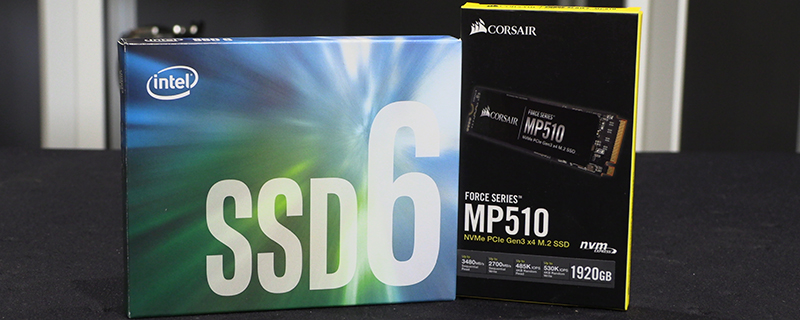2TB M.2 NVMe Shootout – Intel 660P vs Corsair MP510
Conclusion
It is very easy to look at any set of results and conclude that you should buy the best performing thing and that anything which doesn’t match up to the hardware which is best in class should be shunned. It’s the viewpoint that anyone with infinitely more cash than the majority of people would take, pop stars, influencers, film actors, website owners and the like. For the great majority of us budget is the over-riding consideration with any upgrade. We just don’t earn enough to be able to buy whatever we like with impunity and there are far more brick layers, cleaners and copywriters than the first group. So with cost being the primary factor in any purchase the right buying decision is often one that balances getting the best possible value for every one of your hard earned pounds.
That value factor is the thing which makes today’s review so interesting. The pricing of the three 2TB NVMe offerings is wildly different. Currently the Samsung 970 EVO Plus 2TB is £444, the Corsair MP510 1920GB £293 whilst the Intel 660P 2TB is just £194. If one thing is clear it is that the pricing of all large capacity M.2 drives has plummeted from their initial pricing to a level where even the fastest option is still within sight. Yes it might be in the distance but it feels achievable. Saving up for the launch of the 2TB drives with their £2000 price tags was the stuff of lottery winning dreams.
If you’ve had your head turned by the speeds on offer from M.2 drives – and who wouldn’t – then the next consideration is where you fit on the sliding scale of budget and current performance. If you are on an almost unlimited budget, then the Samsung 970 EVO Plus is still the King. The Corsair MP510 is a lot closer to it than its pricing gives it any right to be, but the Samsung is generally a little more consistent in every test and thus the option for people with no real worry about the bill almost regardless of their current setup.
For the enthusiast who wants a lot of performance but has slightly tighter budgetary constraints or only owns either a first gen M.2 drive with it’s 1 GB/s transfer rates or even a blazing fast SATA SSD or below then the Corsair MP510 is an extremely attractive proposition. It’s very nearly as fast as the Samsung, has an attractive black PCB and will improve the performance of pretty much any setup you currently possess. The only people who wont have their socks blown off by the rapidity of its transfer rates are people who already own a high end M.2, and if that’s you then why are you reading this? The 2TB 3GB/s abilities of the MP510 are guaranteed to improve the quality of life of almost everyone and for a shade under 300 notes you really can’t go wrong.
Lastly the Intel 660P is another £100 cheaper than the Corsair MP510 but you’re still getting 2TB of 2GB/s transfer speed for just a hair under £200. All the twos. 2TB. 2GB/s. £200. No it isn’t into the stratospheric transfer abilities of the two models above, but that pricing makes it an extremely attractive proposition whether you own an old M.2 that only just bettered the transfer speeds of a SATA SSD, or you’re just making do with a SATA SSD and want something bigger and faster. For those people, used to 550MB/s, the difference between the third generation SATA SSDs and the Intel 660P is night and day. You will laugh out loud with joy at how responsive everything is. Yes it has a green PCB which will require covering up with a heat spreader unless you have a green theme system or a total disregard for aesthetics, but in every other regard it’s a fabulous value offering.
The Corsair MP510 1920GB combines affordability with blistering speeds and wins our OC3D Performance Award.
With 2TB of capacity, transfer rates just shy of 2GB/s and a sub £200 price tag, the Intel 660P 2TB wins our OC3D Value Award.
Discuss these drives on the OC3D Forums.





